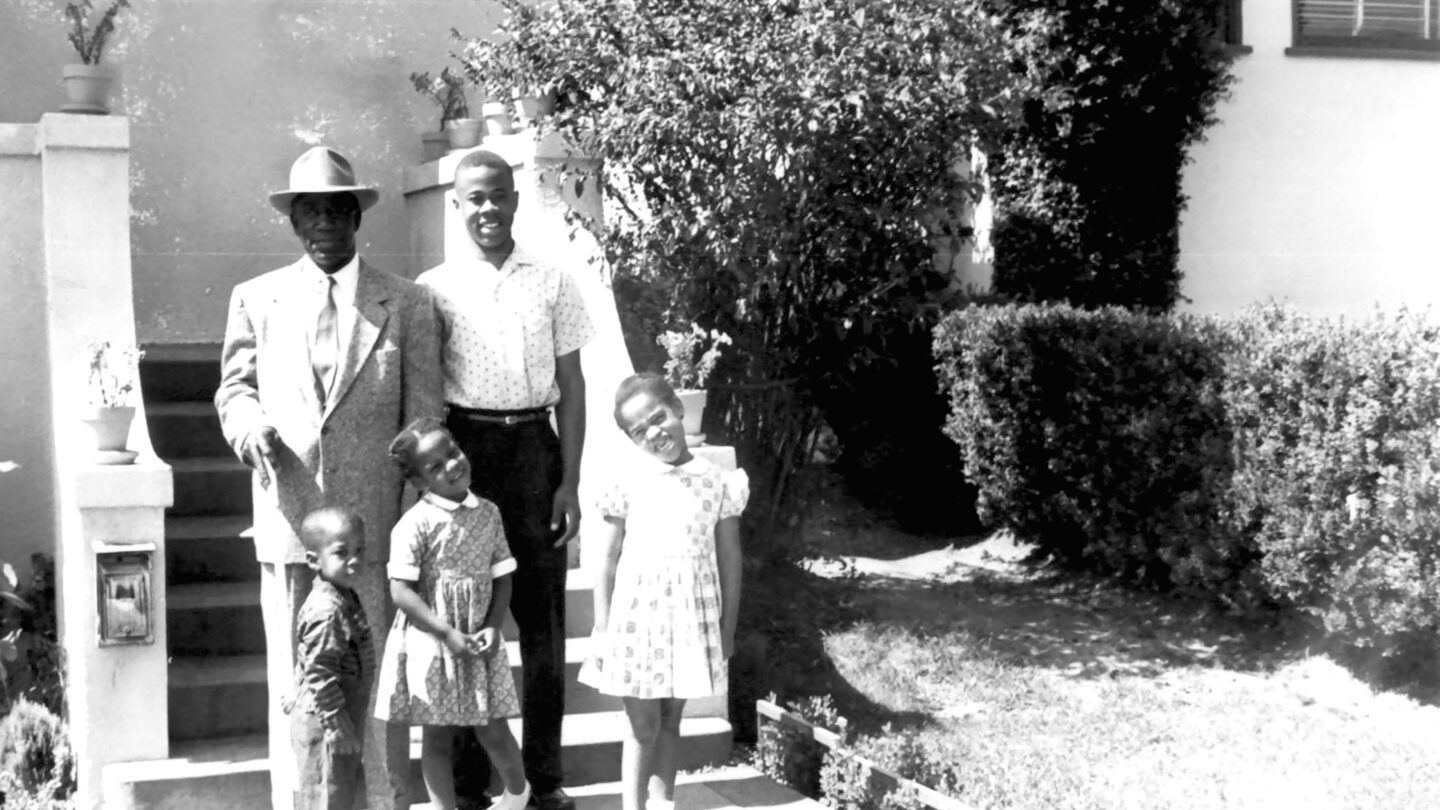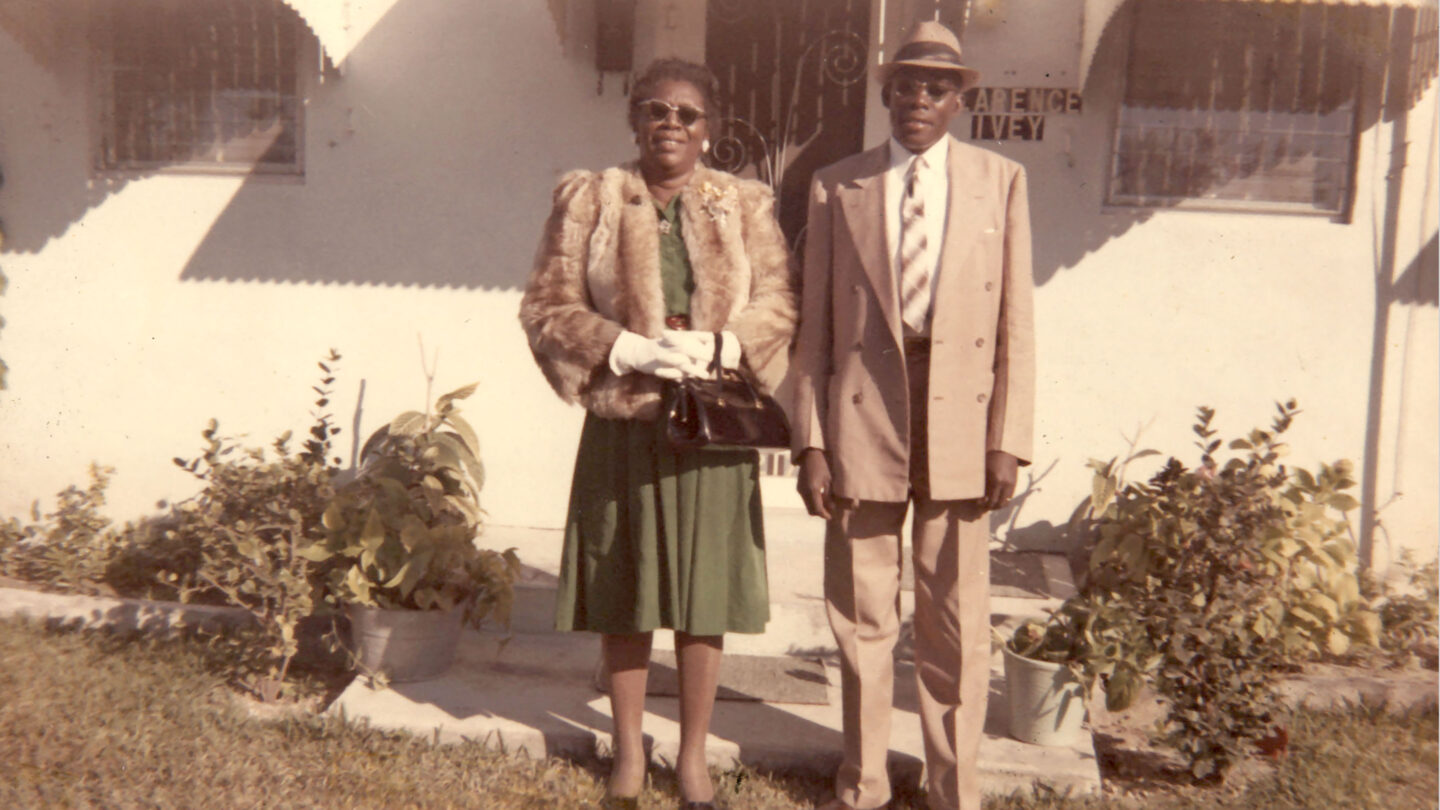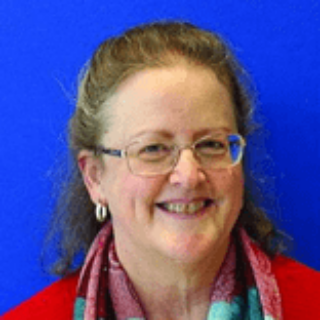
Family of five standing before steps of a house or building. Gardens and Cultural Landscapes of Black America visual arts materials, Cherokee Garden Library, Kenan Research Center at the Atlanta History Center
Traditionally considered the domain of gray-haired researchers sitting in dusty libraries, family history research has moved into the mainstream, appealing to people of all ages, and is as accessible as the mobile device you’re holding in your hand right now.
And summer is an ideal time to begin or to further your family history research as you gather with your families on vacations from school, work, and normal routines.
Man and two girls on front lawn. Gardens and Cultural Landscapes of Black America visual arts materials, Cherokee Garden Library, Kenan Research Center at Atlanta History Center
So how do I begin researching my family history?
The best place to start is with you! Write down what you know (or think you know) about yourself, your siblings, your parents, and your grandparents. Look through your papers, photographs, and other records at home for information to add. Ask family members what information they might be able to share.
How can the Kenan Research Center help me?
Once you’ve gathered all the information you can from home and family, you can begin to search our collections from any computer with internet access through our website at AtlantaHistoryCenter.com. Follow the links for “Learning and Research” and “Search the Collections.”
Our online catalog, Terminus, contains a list of all our published materials and some of our manuscript and photograph collections; Album contains digital images of some of our photographs; and our Finding Aids database contains inventories of some of our manuscript and photograph collections.
Then come see us! We are open by appointment only Tuesday–Saturday from 10 a.m. to 5 p.m. Just e-mail Reference@AtlantaHistoryCenter.com or call (404) 814-4040 to book an appointment. With loads of free parking and two on-site restaurants, you can make a day of it!
Children who know the stories of their parents and ancestors are more successful in navigating the challenges of life than those who do not.
We have many resources that can help you successfully navigate the branches of your family tree; here are just a few of them:
- Our patron computers offer free access to the library editions of three popular subscription-based websites: Ancestry.com provides a wide variety of digitized records from all over the world; Newspapers.com offers full-text searchable access to newspapers all over the country, including the Atlanta Journal-Constitution, and Fold3.com is a great resource for researching ancestors who served in the military.
- In our manuscript, photograph, and map collections, you’ll find city records, such as the 1896 Atlanta census—a typewritten record of the residents of Atlanta, divided by ward, that includes the resident’s place of birth. You’ll also find personal papers and documents pertaining to families and individuals; map collections that contain ownership, tax, and other information about neighborhoods, homes, and businesses; and photograph collections that include images of homes, families, neighborhoods, and businesses. Genealogy and personality subject files can contain pedigree charts, newspaper clippings, and other information about families and individuals.
- The Veterans History Project, and other oral history collections such as Voices Across the Color Line and Living Atlanta, contain audio and video-taped interviews in which narrators recall their life stories.
- Our genealogy library contains over 6,000 volumes, including county, city, and family histories and how-to books that provide help with African American research; Native American research; properly citing genealogical sources; and other genealogical topics.
- And our microfilm collection includes Atlanta City Directories (1859-1997) that can provide information on city residents such as race, marital status, and occupation; Fulton County African American Marriages and Index (1866-1902); and the Fulton County Daily Report (1928–1992). Our microfilm readers can take digital scans of the microfilmed images that can then be saved to your thumb drive, emailed, or saved directly to your FamilySearch.org account.

Couple in front of home with decorative screened door. Gardens and Cultural Landscapes of Black America visual arts materials, Cherokee Garden Library, Kenan Research Center at the Atlanta History Center
What if I need more help?
There’s no question that researching your Black ancestors can be challenging, particularly if your ancestors were enslaved. Genealogical societies such as the Metro Atlanta Chapter of the Afro-American Historical and Genealogical Society (AAHGS) offer programs and other resources for researching Black ancestry. And it’s always a good idea to consider joining a genealogical society in the localities where your ancestors lived so that you can take advantage of local expertise in terms of what records are available and how to use them.
Atlanta History Center also offers quarterly genealogy programs on a variety of topics, including researching your Black family history. One of our most popular speakers, Emma Davis Hamilton, past president of AAHGS, produced a pre-recorded program on using the Freedmen’s Bureau records during the early days of the pandemic. The recording is available on Atlanta History Center’s YouTube channel here. For more information about these programs, please visit atlantahistorycenter.com, e-mail reference@atlantahistorycenter.com, or call (404) 814-4040.
Jackie (16) and Carolyn (3),” on a residential sidewalk. Gardens and Cultural Landscapes of Black America visual arts materials, Cherokee Garden Library, Kenan Research Center at Atlanta History Center.
Researching my family is difficult. Is it worth it?
Robyn Fivush and Marshall Duke of Emory University conducted decades of scientific research that confirm what those of us who love family history have always known: children who know the stories of their parents and ancestors are more successful in navigating the challenges of life than those who do not. According to the study, children who know their family’s story have “better self-esteem, higher levels of social competence, higher quality friendships, and less anxiety and stress. They also had fewer behavioral problems, as reported by parents.”
Fivush concludes, “[Children] need to know that they come from a long line of people who are strong, who are resilient, who are brave… The definition of who they are is not just something independent and autonomous, spun from nowhere. It’s embedded in a long, intergenerational family story.”
Oh yes, it’s most definitely worth it!
Join us on June 18 as we celebrate Juneteenth 2023 by honoring the history of Black genealogy and agricultural practices.
Learn More